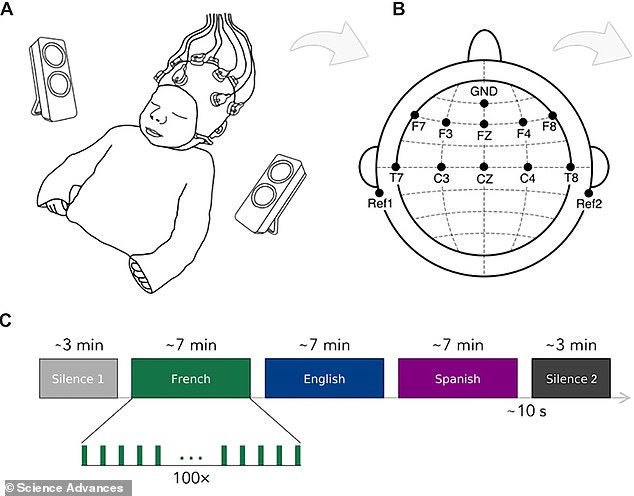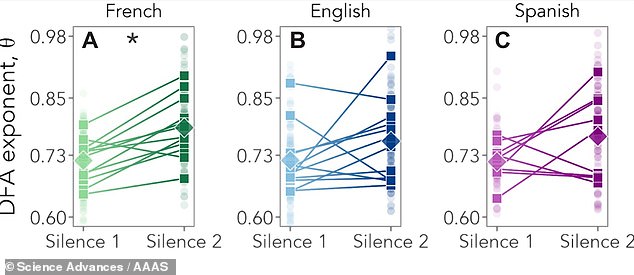Why it pays to be a chatty mum: Babies start learning language BEFORE birth, study finds
>
If you’re an expectant mother, chatting as much as possible can give your baby a head start when it comes to learning to speak.
That’s because new research has found that your unborn baby boy or girl will start learning the language you speak before she’s born.
In experiments, researchers discovered increased activity in the brains of newborns when they heard the language they were exposed to most often in the womb.
The study did not examine exactly when babies become receptive to spoken language while in the womb, although it is known that the fetus begins to hear sounds in the late stages of the second trimester and the beginning of the second trimester.
Therefore, expectant mothers – and fathers too – should not be afraid to chat, and even talk directly to their stomach.
It is already known that between the fifth and seventh months of pregnancy, the fetus can begin to hear sounds outside the womb (archive image)
The new study was led by researchers at the University of Paris Descartes in France and the University of Padova in Italy.
“The prenatal period lays the foundations for further linguistic development,” they say in their paper.
“These findings provide the most convincing evidence to date that linguistic experience already shapes the functional organization of a child’s brain, even before birth.”
It is already known that between the fifth and seventh months of pregnancy, the fetus can begin to hear sounds outside the womb.
Even as early as 16 weeks – unborn babies can react to music played outside the womb by moving their mouths and tongues, a shocking 2015 study revealed.
Previous research has also shown that the mother’s voice can promote a premature baby’s brain development while inside the incubator.
Newborns prefer their mothers’ voice over other female voices and show a preference for the language their mothers spoke during pregnancy over other languages, according to other studies.
However, the team says the precise “neural mechanisms” that allow the developing brain to learn from language experience are still “poorly understood.”
For the study, 33 newborns of French-speaking mothers were monitored using EEG at the Robert Debré Hospital in Paris between one and five days after birth.

For the study, 33 newborns of French-speaking mothers were monitored using electroencephalography (EEG).
An electroencephalogram (EEG) involves a network of small sensors attached to the scalp that pick up electrical signals produced by the brain.
While monitoring their brain waves, the researchers played a gentle audio of the classic children’s story, Goldilocks and the Three Bears.
Story excerpts were played in three languages – French (native language), Spanish (rhythmically similar unfamiliar language) and English (rhythmically different unfamiliar language).
The researchers found that after listening to their native language — French — rather than Spanish or English, the newborns showed “enhanced neural oscillations” linked to language processing abilities.
This suggests that babies were aware of the primary language they spoke while in the womb, which the researchers say comes from their mothers, as well as their mothers’ verbal interactions with other people.
“The results provide the most convincing evidence to date that linguistic experience already shapes the functional organization of the infant brain, even before birth,” the authors say in their paper.

After listening to their native language — French — instead of Spanish or English, the newborns showed “enhanced neural oscillations” linked to language processing abilities.
“Exposure to speech results in rapid but lasting changes in neural dynamics…increasing infants’ sensitivity to previously heard stimuli.”
Mothers will give their babies an educational boost by talking as much as they can during pregnancy, but this shouldn’t be difficult, according to study author Professor Judit Gervin.
“All mothers produce enough speech for their babies to learn while in the womb just by going about their normal daily chores — talking to neighbors, friends, co-workers and family members,” she said.
Professor Gervin added that it “also makes sense” for mothers to speak directly to their babies’ bellies, especially during the third trimester of pregnancy when their hearing abilities are as good as they were in the womb.
She explained that while prenatal language experience “supports” or supports language development, it does not determine developmental outcomes.
In other words, children who do not have much exposure to language in the womb may not necessarily experience developmental decline as children.
It was the study Published in the magazine Advancement of science.
(Tags for translation)dailymail
